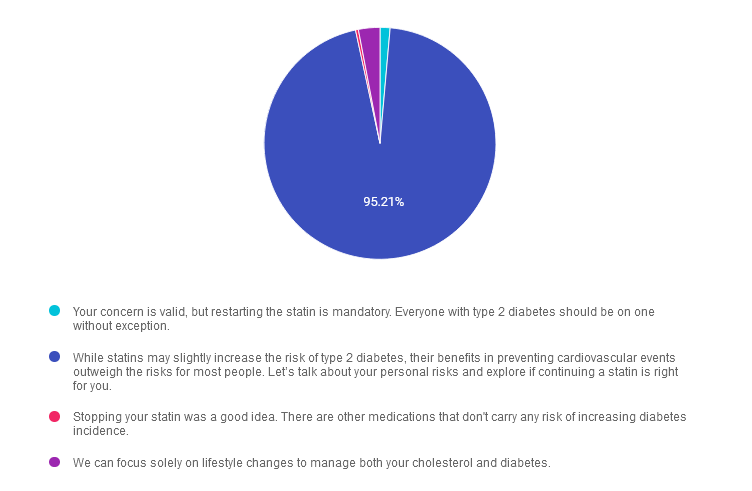For last week’s practice question, we quizzed participants on concerns with diabetes risk and statin use. 95% of respondents chose the best answer. We want to clarify and share this important information, so you can pass it on to people living with diabetes and your colleagues, plus prepare for exam success!
Before we start though, if you don’t want any spoilers and haven’t tried the question yet, you can answer it below: Answer Question

Question: LC is a 49-year-old living with type 2 diabetes and reports during their appointment they have stopped their statin because of concern over risk of type 2 diabetes incidence with statin use.
Using the ADA Standards of Care as a guide, what would be the best response to LC concerns?
Answer Choices:
- Your concern is valid, but restarting the statin is mandatory. Everyone with type 2 diabetes should be on one without exception.
- While statins may slightly increase the risk of type 2 diabetes, their benefits in preventing cardiovascular events outweigh the risks for most people. Let’s talk about your personal risks and explore if continuing a statin is right for you.
- Stopping your statin was a good idea. There are other medications that don’t carry any risk of increasing diabetes incidence.
- We can focus solely on lifestyle changes to manage both your cholesterol and diabetes.

Getting to the Best Answer
Answer 1 is incorrect. 1.40% chose this answer. “Your concern is valid, but restarting the statin is mandatory. Everyone with type 2 diabetes should be on one without exception.” Although statins are recommended for most people with diabetes, especially those over 40, the ADA emphasizes individualized care. There may be specific cases where statin use is not appropriate. Mandatory recommendations fail to consider individual preferences and circumstances, which are central to person-centered care.
Answer 2 is correct. 95.21% of you chose this answer. GREAT JOB! “While statins may slightly increase the risk of type 2 diabetes, their benefits in preventing cardiovascular events outweigh the risks for most people. Let’s talk about your personal risks and explore if continuing a statin is right for you.” This response acknowledges LC’s concern while addressing the evidence-based benefits of statin therapy for cardiovascular disease prevention. Statins are generally recommended for people with diabetes because cardiovascular protection outweighs the slight increase in diabetes incidence. This option promotes person-centered care by encouraging a collaborative approach.
Answer 3 is incorrect. About 0.40% of respondents chose this. Stopping your statin was a good idea. “There are other medications that don’t carry any risk of increasing diabetes incidence.” This response is misleading and may not be the best recommendation for LC. The ADA recommends considering the individual’s cardiovascular risk profile, not discontinuing statins simply because of concerns about diabetes incidence.
Finally, Answer 4 is incorrect. 2.99% chose this answer. “We can focus solely on lifestyle changes to manage both your cholesterol and diabetes.” Discontinuing statins without clinical justification could increase LC’s risk of cardiovascular events. The ADA recommends a combination of lifestyle changes and pharmacotherapy, when appropriate, for optimal outcomes.
We hope you appreciate this week’s rationale! Thank you so much for taking the time to answer our Question of the Week and participate in this fun learning activity!
Want to learn more about this question?
Live & On-Demand Viewing
FREE Webinars this November!!




Why Attend These Webinars?
- Accessible learning: All webinars are available online, so you can attend from the comfort of your home or office.
- Expert-led: Presentations are led by experienced diabetes educators, healthcare professionals, and researchers.
- Practical advice: Each session is designed to give you actionable strategies that can be applied in your daily life or practice.
- Up-to-date information: Stay informed about the latest research, guidelines, and technology in diabetes care.
How to Register?
Register above or simply visit DiabetesEd.net and browse the Free Resources Tab. While most webinars are available to attend at no cost, you have the option to purchase the session if you wish to earn Continuing Education (CE) credits.
For more information or any questions, please email [email protected].
Instructor: Beverly Thomassian RN, MPH, CDCES, BC-ADM is a working educator who has passed her CDCES Exam 7 times. She is a nationally recognized diabetes expert for over 25 years.
Sign up for Diabetes Blog Bytes – we post weekly Blog Bytes that are informative and FREE! Every week we post one exam practice Question of the Week and Rationale of the Week. Sign up below!
The use of DES products does not guarantee the successful passage of the certification exam. CBDCE and ADCES do not endorse any preparatory or review materials for the CDCES or BC-ADM exams, except for those published by CBDCE & ADCES.









